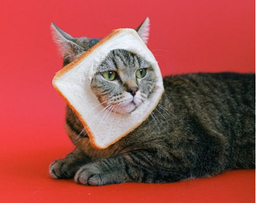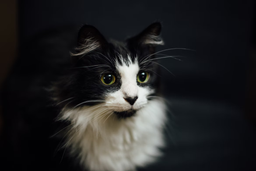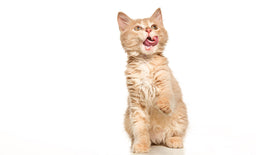Can cats eat vegetables? Untamed explains the pros and cons of including veggies in your feline's diet
Can cats eat vegetables, or should you avoid them in your furry friend’s diet? Cats are obligate carnivores, so their meal plan should consist of meat and pretty much nothing else. As vegetables are mostly fibre and carbs, they aren’t nutritionally appropriate for your feline, who requires mainly protein and fat in their diet. That’s why your kitty should never be a vegan.
Veggies have various micronutrients beneficial to humans, but cats cannot absorb most of them properly because their digestive tract is designed to process meat. Other than being mostly useless, some veggies are also extremely toxic to cats. Untamed explains which veggies are safe and what your cat should and shouldn’t eat to help you create the best tailor-made plan for your furry friend.

I don’t like green stuff. Give me some yummy and crunchy bacon, please!
Source: kingkronoscat
Vegetables cats can eat
Felines absorb all necessary nutrients (vitamins and minerals included) from meat and fish. Vegetables have excellent nutritional value, but your cat won’t benefit much from them. While vegetables aren’t necessary in your cat’s diet, some can help with digestion and bowel movement, so you can give them as a snack occasionally.
Let’s check out which veggies are safe for cats!
Broccoli
You can serve broccoli to your cat to support healthy bowel movements and calm an upset stomach, but you must cook it and let it cool. Gently steaming broccoli preserves the highest amount of nutrients and makes it soft.
Offer broccoli as an occasional treat because it may lead to diarrhoea.
Pumpkin
Small amounts of cooked pumpkin might help your kitty with constipation. Some vets recommend including pumpkin in a cat’s diet if they have a sensitive tummy and frequent indigestion.
If you decide to offer a bit of pumpkin, you must cook it before serving. Remove the seeds because they can obstruct your kitty’s airways and cause choking. Chop the veggie into small pieces or prepare a pumpkin puree and add it to your feline’s food from time to time if they like it.
Peas
Peas are safe for feline consumption. Many manufacturers include it in cat food as a filler, but it doesn’t mean that your furball should eat too much of it. Give peas in small quantities, and exclude them altogether if your furry friend’s food already contains them.
Some nutritionists claim that peas support a cat’s digestive system and healthy bowel movement, but the vegetable can also cause diarrhoea if consumed in large quantities. Make sure you cook peas before you feed them to your cat. Kittens shouldn’t eat peas, so serve this vegetable to adult and senior cats only.
Cucumber
Some vets suggest that cucumber can be an excellent source of moisture for kitties. Cucumber is one of the few vegetables that can be served raw, but you must remove the skin and wash it thoroughly.
If your cat likes this veggie, serve it in small amounts and only occasionally. Eating too much cucumber can result in diarrhoea.
Carrot
Cooked carrots are safe for cats, while raw ones present a choking hazard. If you’re serving carrots to your kitty, make sure they’re bland. After you boil or steam the carrot, wait for it to cool before offering it to your feline companion.
Carrots are rich in vitamins A, K, B6, potassium, and fibre, so some cat parents add shredded cooked carrots to their felines’ regular meals, but there are no relevant studies that prove cats can benefit from this vegetable.
Asparagus
Cats can eat asparagus, and sometimes it can even prevent them from chewing on house plants. According to some vets, asparagus may help with an upset stomach and accompanying symptoms, such as diarrhoea or constipation. The vegetable is high in fibre, so overconsumption can lead to gastrointestinal and urinary problems. If you’re feeding asparagus to your furry companion, cook it properly because it represents a choking hazard when eaten raw.
As this veggie is highly alkaline, large amounts can compromise your cat’s immune system. It can also affect healthy bacteria levels in their urinary tract, causing urinary infections.
Zucchini
Zucchini is low in calories and high in water, and it does not pose a threat to your feline's health. It doesn’t mean that you should feed this vegetable to your cat every day, but it can be an occasional treat. You must cook the vegetable and let it cool before feeding it to your feline companion.
Potatoes
While potatoes aren’t toxic to cats, they don’t really benefit from this veggie, so you don’t need to include them in their diet. If you decide to offer your cat potatoes, make sure they’re thoroughly cooked and unseasoned. Keep in mind that potatoes are high in carbs so they should be an occasional treat, not a part of your cat’s regular meals. Fried potatoes can cause health problems and obesity in cats, so don’t give them to your furry friend.
Corn
Some manufacturers use corn as a filler in cat food. It is safe, but cats cannot get any nutritional benefits from it. You should opt for products with meat as the main ingredient and not inadequate substitutes, such as corn.
Lettuce
Lettuce mostly consists of dietary fibre. As per some cat nutrition specialists, a small amount might help your cat with digestion or constipation.
Too much lettuce can lead to diarrhoea, so if you’re feeding leafy greens to your furball, make sure not to overdo it. One small serving per week is more than enough.
To avoid choking incidents, chop the lettuce into small pieces. You don't have to cook it. All types of lettuce are safe for cats, including:
- Iceberg
- Leaf
- Romaine
Spinach
Spinach can be safe for cats, but only if they don’t suffer from urinary tract diseases. This plant contains calcium oxalate, which can contribute to the development of struvite crystals. The accompanying symptoms are:
- Bloody urine
- Painful, difficult, or frequent urination
- Spraying
- Excessive licking of the genitals
If your cat has a healthy urinary tract, you can safely feed them spinach in small amounts.

What is that green delight? Can I try some, hooman?
Source: siamesecheese
Vegetables cats cannot eat
Some vegetables are so toxic to cats that even the tiniest amount can cause severe poisoning and death. If your feline friend has eaten the following vegetables, contact your vet immediately.
Garlic
Garlic is the most toxic of allium vegetables as it can destroy your cat’s red blood cells. Consuming even a clove of garlic can lead to hemolytic anaemia and severe gastroenteritis. If these conditions aren’t treated immediately, the outcome can be significant organ damage and death.
Tomatoes
Tomatoes contain solanine, a natural pesticide highly toxic to cats. Not even cooking can reduce solanine to safe levels, so cats shouldn’t eat tomatoes. You should also avoid sauces and soups containing this vegetable.
If your cat happens to take a piece of tomato, monitor them for the next 24 hours. In case they exhibit any of the following symptoms, take them to the vet:
- Diarrhoea
- Vomiting
- Appetite loss
- Lethargy
- Dilated pupils
- Disorientation
- Excessive drooling
Onions
Onions are highly poisonous to felines in any shape and form—raw, cooked, and powder. Onions attack feline red blood cells and break them down, potentially resulting in death if not treated quickly. Signs of onion toxicosis include:
- Vomiting
- Diarrhoea
- Lethargy
- Fainting
- Anaemia
- Bloody urine
- Elevated heart rate
If your cat eats onions, take them straight to the vet.

Allium vegetables are highly toxic to cats because they attack their red blood cells.
Source: Markus Spiske
If veggies are mostly safe, can cats eat fruit, too?
Yes—cats can eat some fruit if served in small amounts. The following items are safe for feline consumption:
- Strawberry
- Banana
- Apple
- Seedless watermelon
- Berries
- Mango
- Pineapple
- Cantaloupe
Strawberries
You can safely feed strawberries to your kitty, but be careful not to overdo it. High sugar levels in strawberries can lead to diabetes. Remove stems and leaves before serving this fruit to your furball.
Banana
Banana is a safe treat if served in small amounts. Most cats will reject it because they can’t taste sweet, and the aroma isn’t particularly enticing to them.
Apple
Cats can safely eat apples, but you should remove stems and seeds before serving. Don’t forget to cut the fruit into small pieces.
Seedless watermelon
Felines can eat small portions of watermelon flesh. It must be seedless as seeds are a choking hazard. Too much watermelon can cause bloating, so make sure that you don’t overfeed your kitty.
Berries
All berries are safe for feline consumption. They are high in antioxidants and fibre, so some vets say that berries can help cats lose weight. If you decide to give them as a treat, make sure to cut the fruit into bite-sized pieces before you serve them to your feline companion.
Mango
You can occasionally offer small cubes of mango flesh to your furry friend but avoid the skin and seeds. As kitties can’t taste sweet, they probably won’t like mangoes. If your kitty enjoys this fruit, give it in small amounts.
Pineapple
Pineapple can be served to your cat if it’s fresh. Avoid canned pineapple as it is often packed with sugary syrup and preservatives. Be careful to remove all leaves, thorns, and rind before feeding pineapple to your furry companion.
Cantaloupe
Cantaloupe is relatively low in calories, so it might be good for kitties who need to lose weight. Some cats find cantaloupe irresistible because its scent resembles the aroma of meat proteins. If that's the case with your feline, serve the fruit in small bite-sized cubes occasionally.
Fruits cats shouldn’t eat
Not all fruits are safe for your kitty. Cats shouldn’t eat the following:
- Grapes and raisins—If your kitty ingests grapes or raisins, they can experience vomiting, diarrhoea, lethargy, and even kidney failure
- Citrus fruits—Oranges, lemons, and limes can cause digestive issues, vomiting, diarrhoea, and even depression

Cats get all the necessary macronutrients from meat.
Image (c) Untamed
What should an ideal cat diet consist of?
Check out the table below to see the ideal nutrient ratio in a cat’s diet:
|
Nutrient |
Recommended amount |
|
Protein |
Over 50% |
|
Fat |
Up to 20% |
|
Carbs |
Less than 3% |
Your cat’s diet should mostly consist of animal protein because it contains essential amino acids, such as taurine and arginine, crucial for good eyesight, seamless digestion, heart muscle resilience, normal pregnancy, and efficient immunity. Animal protein also provides the necessary calories cats need for energy.
The best cat food products fit the nutritional requirements presented in the table. Wet food is the closest to your cat's natural diet, but the same cannot be said for semi-moist or dry cat food. Cat kibble is high in carbs because it’s usually made from meat derivatives, veggies, and grains. Keeping your feline companion on a dry food diet can lead to diabetes and obesity. Biscuits can also cause dehydration because they don’t contain enough moisture. Since most cats are not avid water drinkers, they won’t drink water to compensate for the lack of moisture in their bodies.
Dry food can be good for oral hygiene, so you may combine dry with wet or semi-moist cat food to help your kitty retain their dental health while staying hydrated and fit. Make sure that wet food servings correspond with your cat’s weight, age, and lifestyle.
The best treats for your furry friend
Vegetables probably aren’t your kitty's favourite snack. Cats prefer deli meats, such as ham and bacon, and organs (e.g. liver) which are also safer treats. Keep in mind that deli meats tend to be high in sodium, so serve them sparingly.
Offer poultry, fish, or seafood (e.g. chicken, turkey, tuna, salmon, sardines, prawns) because they are super tasty and healthy for your feline companion. You can also opt for B.A.R.F. treats, but they carry the risk of bacterial infections and should be handled according to strict sanitary protocols.

This smells incredible! Thank you for buying the perfect food, hooman!
Image (c) Untamed
Untamed—the best wet food for your furball
If you’re looking for a true delicacy, Untamed ticks all the right boxes. Our nutrient-packed jelly and gravy meals are prepared with premium cuts of human-grade meat, completely free of animal or vegetable derivatives and other fillers like grains and sugar. Untamed dishes are:
- High in protein—Untamed savoury meals contain twice as much protein as the industry standard
- Vet-formulated—We worked with vets on all recipes to give your kitty the highest-quality food that tastes great. Every Untamed dish is free of all known allergens
- Ethically sourced—Untamed food contains ingredients obtained from sustainable and dolphin-safe sources. Our packaging is 100% recyclable, and we leave a neutral carbon footprint
- Irresistible—As our dishes are tasty and impossible to resist, even the pickiest eaters who aren’t fond of wet food will ask for more
- Nutrient-packed—We gently steam our dishes to preserve the bioavailability of nutrients and the aroma
- Fit for any indoor cat—You can serve Untamed to a cat of any breed, be it a Persian, Siamese, Bengal, Ragdoll, Maine Coon, or British Shorthair
- Suitable for all life stages—You can give Untamed to kittens, adults, and senior cats, including those without teeth
Take our TRY NOW quiz and get your first order at the best rate.

Untamed contains twice as much protein as the industry standard.
Image (c) Untamed
Why cat parents love Untamed
Here’s what you can expect after switching your cat to Untamed:
|
Timeline |
Health improvements |
|
One week |
|
|
Two months |
|
|
Four months |
|
|
Six months and beyond |
|
How to order Untamed
To give Untamed a go, visit our online cat food store and follow the steps below:
- Complete the questionnaire and tell us about your kitty’s allergies and taste preferences
- Select a meal plan
- Place your order
We will deliver the tailor-made taster pack to your door within a day with no additional shipping costs. If your furball likes Untamed, we will deliver your supplies around the same date each month. With our handy cat food subscription in place, you won’t have to worry about pet pantry shopping any longer.
You can postpone, alter, pause, or cancel your order at any time!
What not to give to your cat
The following popular products should be off your kitty's menu:
- Dairy products—It is a little known fact that most cats are lactose intolerant. They lack the enzymes needed to process dairy products. Cats shouldn’t eat cheese or drink milk. The same goes for kittens. If you are raising a foster kitten who isn’t weaned off, give them the kitten milk replacer formula (several times a day) and not cow milk
- Caffeine—Kitties are especially susceptible to the effects of caffeine. It can cause seizures, tremors, restlessness, irregular heartbeat, and breathing difficulties
- Alcohol—Alcohol is highly poisonous to cats, and even the tiniest amount can cause depression, liver failure, coma, and death
- Chocolate—You should never feed chocolate to your feline friend because it contains caffeine and can cause restlessness, irregular heartbeat, breathing difficulties, muscle tremors, and hyperactivity
- Yeast and raw dough—Yeast and all types of dough, including bread dough, can cause gastrointestinal distress and digestion problems. The yeast can ferment in your kitty’s tummy and turn into alcohol, which can lead to kidney and liver failure
- Raw food and bones—Cooked chicken is the best meat for your furry friend, but the same cannot be said for raw meat and eggs. Raw food can contain harmful bacteria, such as Listeria, Salmonella, and E. coli that can cause severe infections so it’s best if you avoid it
Check out our other guides to what cats can or cannot eat:
|
|

![Best food for Ragdoll cats in the UK [Broken Down]](http://untamed.com/cdn/shop/articles/featured_best_food_for_ragdoll_cats_uk.jpg?v=1646818249&width=256)

